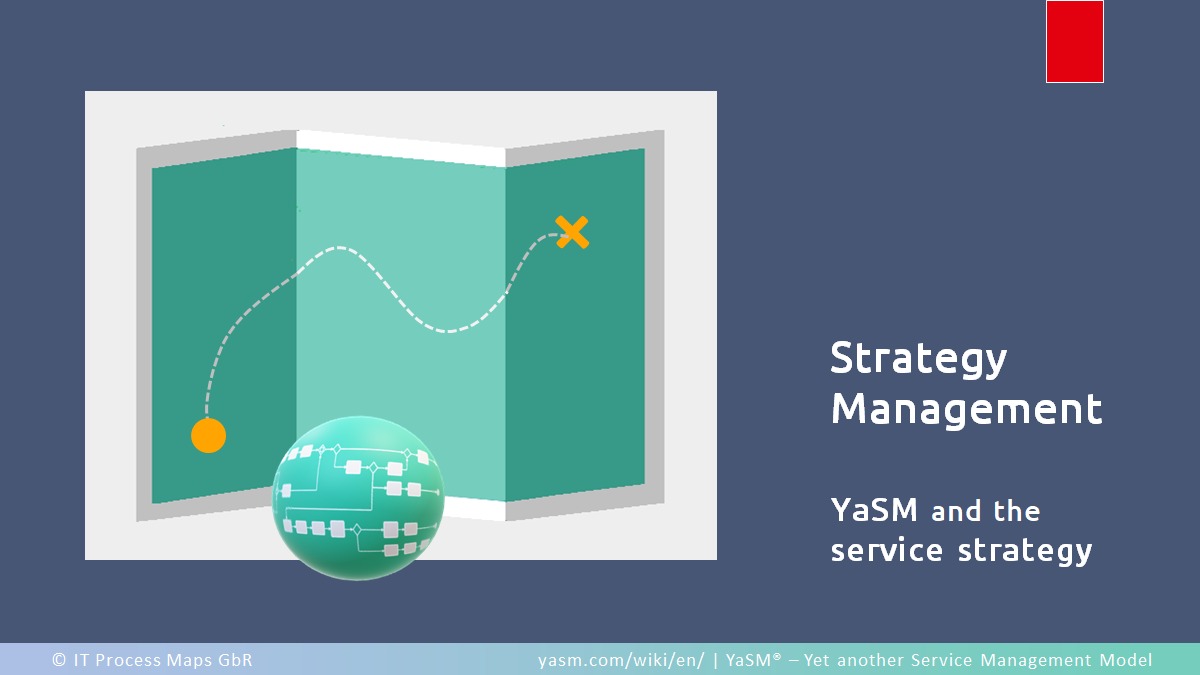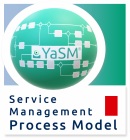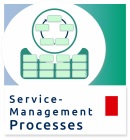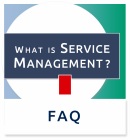Strategy Management
The practice of strategy management is the application of strategic thinking in the domain of service management.
The concepts and ideas of 'strategic management' have a long history and are a whole management discipline in their own right, with numerous models and frameworks to support strategic decision-making in businesses.
High-profile contributors to the discipline include Peter Drucker [1] and Michael Porter [2].
Strategic management
Strategic management is about formulating longer-term goals and implementing these goals, taking into account the organization's resources and its competitive environment. It involves activities such as
- analyzing the market
- determining a market position
- setting objectives
- creating a strategic plan
- deploying the strategy.
Strategic thinking applied to service management
Although strategic management does not have its origins in service management frameworks, service providers will benefit from the application of strategic thinking, just as any other organization or business. For this reason, many ideas of strategic management have been incorporated into the discipline of service management over the years.
Today, all major service management frameworks recommend that service providers apply strategic thinking to guide the development of their service offerings:
- ITIL®, for instance, includes the service strategy practice that aims to establish the organization's direction and clarify the priorities [3].
- COBIT® contains a process called "Manage strategy",
- and CMMI-SVC® includes a process area "Strategic service management".
- In VeriSM™, the service strategy and its ongoing maintenance are presented as a key element of organizational governance.
Essentially, all frameworks suggest that service providers assess the market's (current and future) needs and their own capabilities at regular intervals. Based on this assessment, they should define a strategy or roadmap for developing their capabilities, to provide a set of services that meet their customers' requirements.
Still, service strategy is not high on the agenda at many service providers. This may be because of the way it is presented: The ITIL V3 book about service strategy describes service strategy concepts, principles and processes on almost 500 pages [4]. This huge amount of guidance seems to suggest that service strategy is a complex and difficult topic, so many service providers, especially smaller ones, focus their attention on other areas such as incident, problem and change management.
That is regrettable because every service provider will benefit from strategic thinking and longer-term planning.
Straightforward: YaSM strategy management
Against this background, the YaSM service management model includes a straightforward strategic process focused on the essentials that is not too difficult to understand. With this practical guidance, organizations of all sizes will be able to realize the benefits of pursuing a service strategy (see also our related article on 'ITIL light').
Organizations that need more sophistication are free to look for additional guidance in ITIL - or indeed in other sources like the many management books about business strategy.
The strategy management process in the YaSM model includes five sub-processes:
- Performing strategic assessments
- Providing guidance for the use of technology
- Defining strategic initiatives
- Starting up service development projects
- Monitoring strategic initiatives
For each sub-process, YaSM provides a detailed template that describes the process activities, roles, inputs and outputs.
In addition, YaSM contains document templates for the key outputs from the strategic process:
- The strategic objectives are a set of specific goals the service provider aims to achieve by pursuing the service strategy.
- The strategic plan (also referred to as the 'service strategy') identifies precisely how the service provider will achieve its strategic objectives.
If you are interested to learn more about YaSM's strategic process, you can find detailed information here in the Service Management Wiki, including a description of the strategy management process and its sub-processes, a list of the process outputs with their definitions, and a complete RACI matrix.
Video
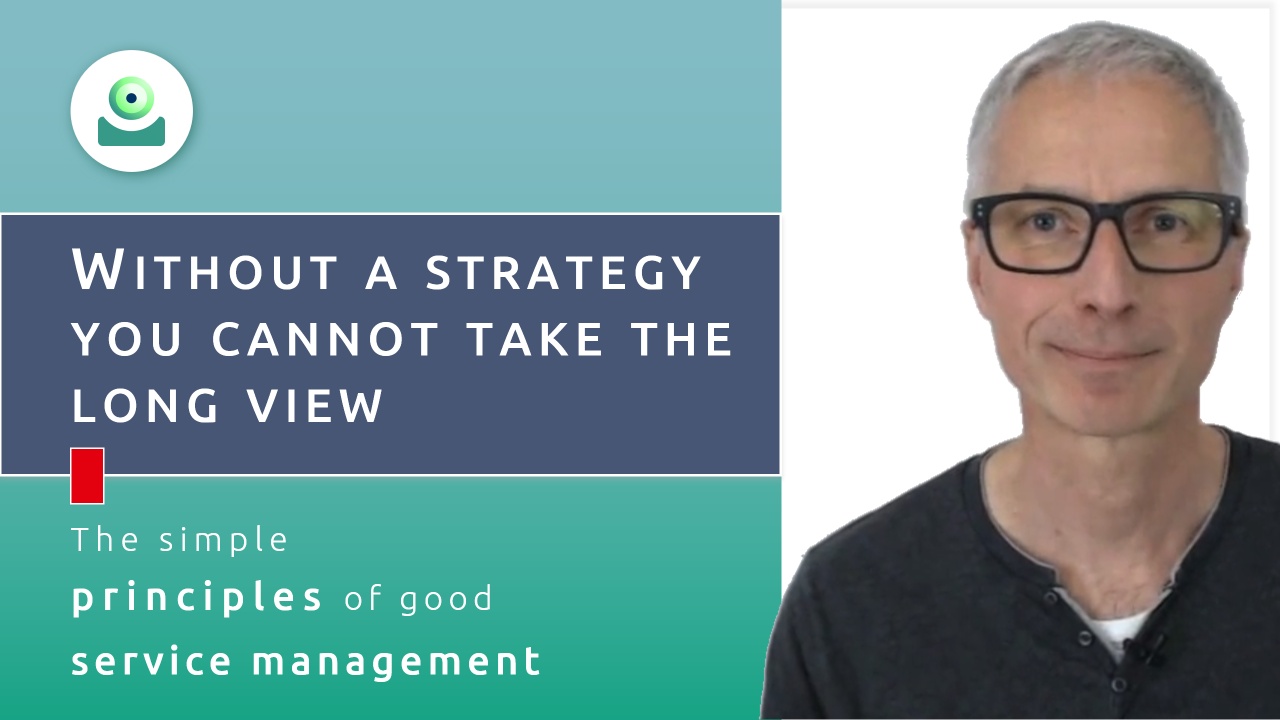
In this video you'll learn more about what strategic thinking means in the context of service management, and what kind of advice you can find in the YaSM model.
(From our video series "The simple principles of good service management").
Watch the video:
⯈ Without a strategy you cannot take the long view (10:04 min.)
Related pages
- YaSM service management processes ➔ LP1: Set the strategic direction
- ITIL 4 practices and YaSM processes
- YaSM and ITIL V3 ➔ YaSM vs. ITIL service strategy
External links and references
[1] Peter Drucker. -- Wikipedia. Retrieved July 09, 2024.
[2] Michael Porter. -- Wikipedia. Retrieved July 09, 2024.
[3] AXELOS, 2019. -- AXELOS: ITIL® Foundation, ITIL 4 Edition. - The Stationery Office; Norwich, UK, 2019.
[4] Cabinet Office, 2011. -- The Cabinet Office: ITIL® Service Strategy (2011 Edition). - The Stationery Office; London, UK, July 2011.
[5] IT Process Wiki - ITIL Service Strategy. -- S. Kempter: IT Process Wiki, "ITIL Service Strategy. - IT Process Maps; Lindau (Bodensee), Germany.
By: Stefan Kempter ![]() , IT Process Maps.
, IT Process Maps.
Strategic management › Strategic thinking applied to service management › Straightforward: YaSM strategy management › Video

